|
MINTON SPARKS
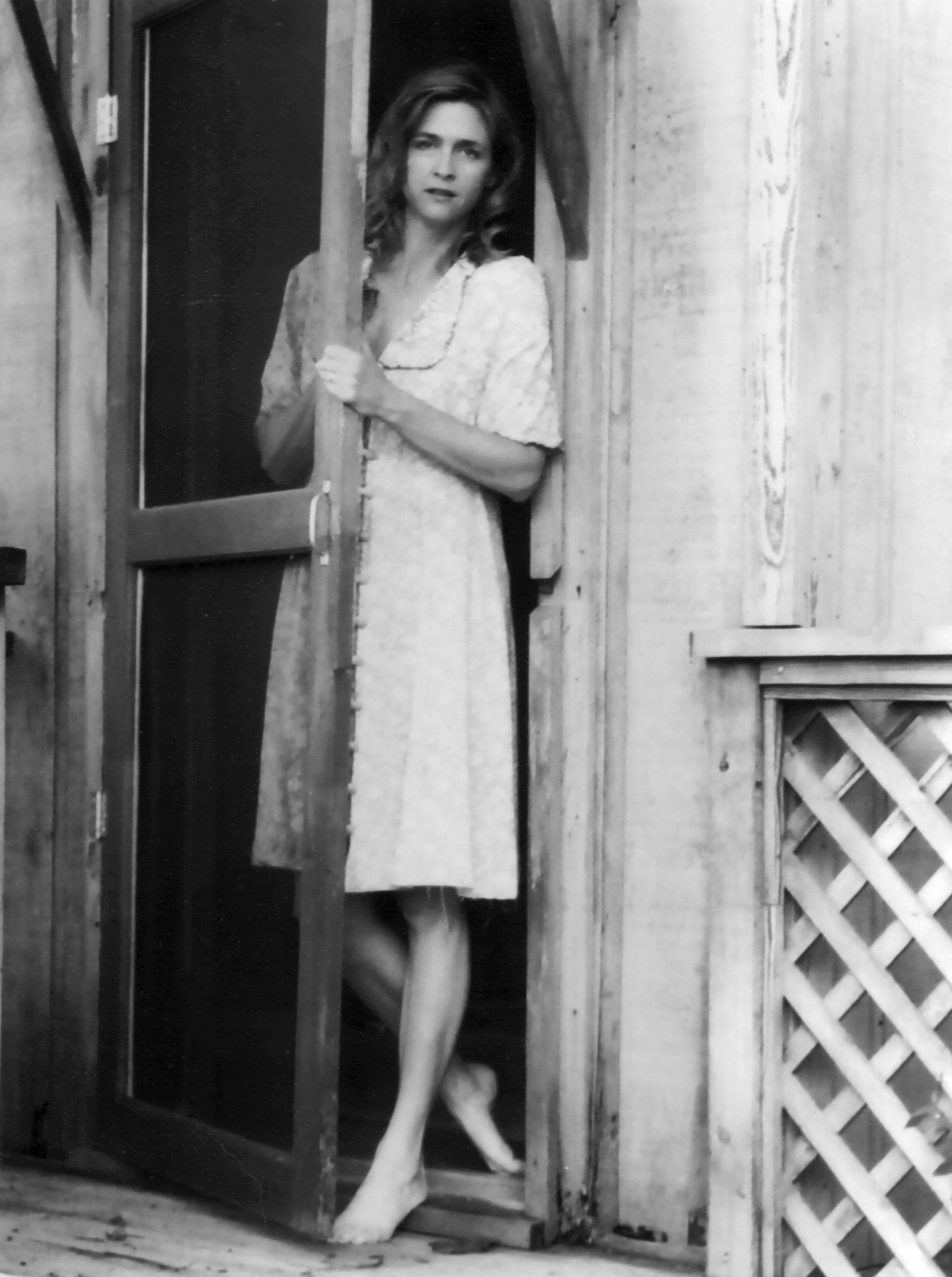
This
edition we spotlight the amazing MINTON SPARKS, pictured
left. The Nashville-based spoken word musical artist and college professor
must be considered one of the most potent spokespersons for the human community
gracing the stage today. Minton is an open wound of searing personal insight,
particularly the human experience as mirrored in the lives of her family. Oh the
suffering of such who are gifted with writing progeny, and the joy. Minton
explores it all with treacherous insight and razor wit. And then she dances.
Minton
was brought to my attention by Links buddy Steve Conn, who produced her
first album, "This Dress," and sometimes accompanies her on piano. I
started scrambling around the Internet to learn more about Minton, and things
started to become curiouser and curiouser.
There
are, of course, other spoken word artists and monologists. These aren't quite
the same, but I have tended to find them (Jello Biafra, Patty Smith, Spalding
Gray, even Garrison Keillor) so. While all of the performing arts rely on the
fine tuning of theatrical presentation, there is something about
"performance art" that almost always seems, well...like performance
art. Go check out Minton Sparks' YouTube collage at http://www.youtube.com/watch?v=-q4EHAwYNms.
Minton writes South - south of dishonesty and the heart's Mason-Dixon
line, where you can feel the thick heat and bug bites. You hear Eudora Welty and
Harper Lee in her voice, maybe even Minnie Pearl. She is by turns funny and
sorrowful. She drops emotional bombs, people leave exhausted.
Minton's
connection to the music that accompanies her words is more palpable than it is
in most singer/songwriter discourses. Maybe the distance that she views the
world from, so apparent in her language, gives her a similar advantage as she
rides the ether of spare instrumentation. What is it about this woman that
resonates so deeply within this writer's breast? Minton hurts like a free fall,
with all protections left in storage. Hers is one of the most riveting acts
working in music today, a high-wire feat of grace and simplicity that carries
more wattage than any bombastic rock band this side of U2.
It
is with great pride that RARWRITER presents featured artist Minton Sparks.
"Minton
Sparks is a great storyteller. Humanity with humidity all told humorously with
humility. Sin Sick is just what the doctor ordered." - John Prine
"Minton
Sparks sounds like my momma, my Aunt Dot, my Aunt Grace and even a bit like my
Uncle Jack-only better and wilder and heartbreakingly more powerful. If I could
have heard poetry like this as a girl, I wouldn't have had to waste all those
years thinking we were dumb as dirt." - Dorothy Allison
MINTON
SPARKS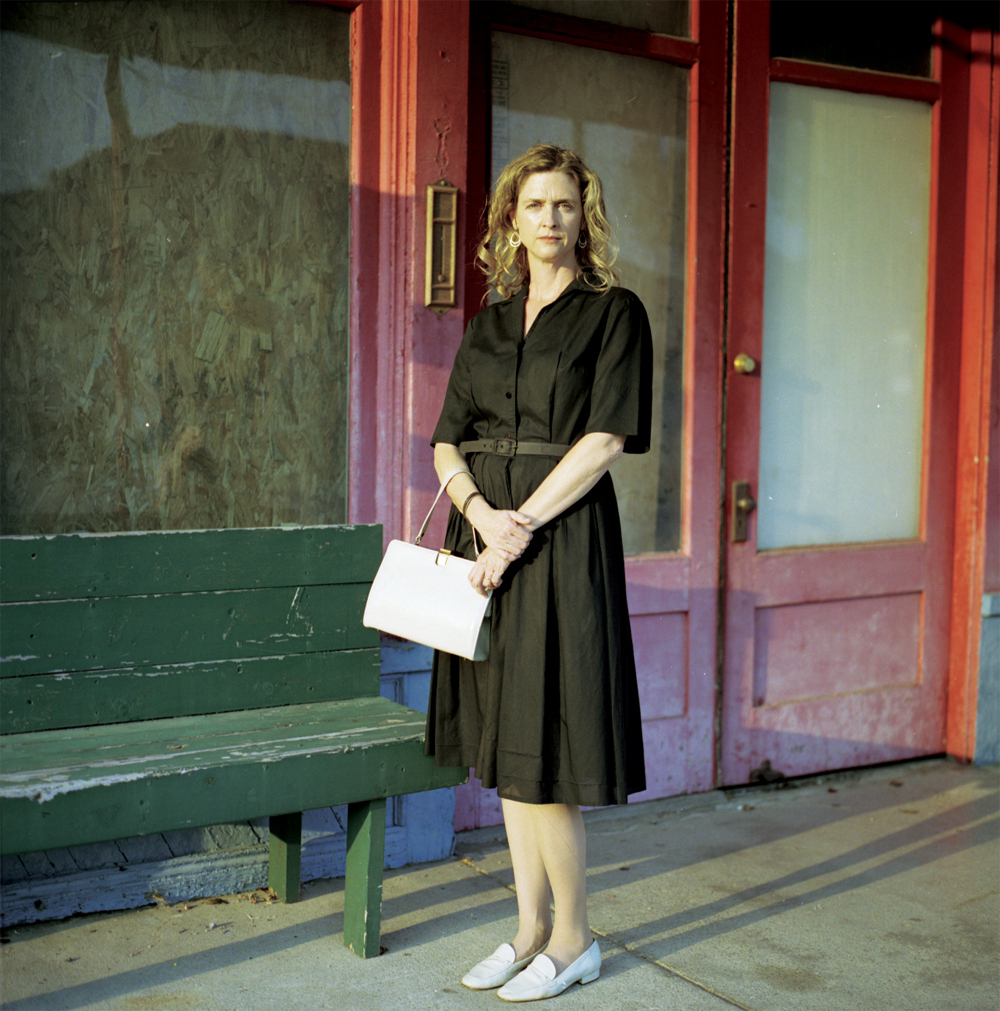
by
RAR
As I listen to your recorded work, the voices of two distinctly Southern
writers come to mind: Eudora Welty and Harper Lee. Am I off base there? Who
would be better examples of writers who influenced you in developing your style
and voice?
This is always difficult to answer. I’m never able to site direct
influences—though I live and breath by writers like Annie Dillard and more
recently Marylynn Robinson. I love writing that has arrived in my life at just
the right time… oftentimes, if you try to read the book before you are ready
the writing will not land with the reader. If it is the right time, the
writing saves a life or changes the world, obviously that comes in so many
different packages.
I love writers who mythologize the immediacy of moments. Dinging the bell
by naming experience that broadens or deepens my perspective, Writing that
takes me to a new planet. Favorite writers: Annie Dilliard, Gabriel Garcia
Marquez, Maya Angelou, May Sarton. Poets: Adrienne Rich, Sharon Olds, John
Keats.
Songwriters are equally influential: Leonard Cohen, Nanci Griffith, Darrell
Scott, Gretchen Peters, Steve Conn,
With a name as unique and attention getting as “Minton Sparks,” you seem
born to theater? Do you feel that way? Did your parents have some destination in
mind for you?
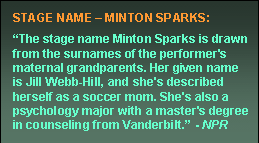 My name comes from my maternal grandmother. She was a Minton and married a
Sparks. I often run into folks who know we must be related b/c if you’re
from Arkansas and associated with both of those names, you are related to me.
In my heart I was born to play professional basketball but the WNBA went on
hiatus the year I wanted to try out. My name comes from my maternal grandmother. She was a Minton and married a
Sparks. I often run into folks who know we must be related b/c if you’re
from Arkansas and associated with both of those names, you are related to me.
In my heart I was born to play professional basketball but the WNBA went on
hiatus the year I wanted to try out.
Are you a musician?
I play guitar and consider myself to be very rhythmical, but can’t come
close to the level of the musicians that I collaborate with. I tend to use my
musicality to find pocket rhythms in poetry rather than accompany myself. I’m
working on playing slide guitar right now and plan to work that into our show
at some point
How do you construct your musical pieces? Do you compose for your lyrics? Or
in some way communicate your musical intent to instrumental collaborators? How
is the instrumentation selected? The solo accompaniment carries special power
mated to the cadence of your voice. There is something plaintive about the
sound. I assume this was all part of your concept?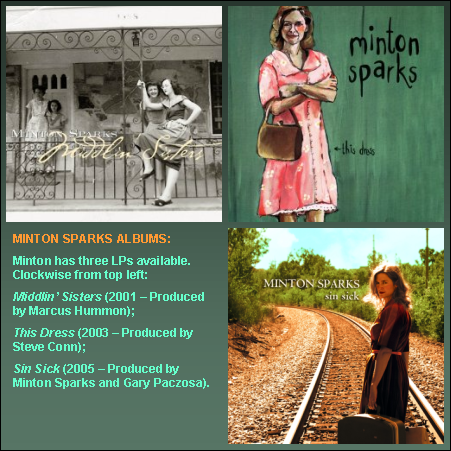
The musical collaborations have evolved depending upon the individual
musician. If I am playing with someone “new,” I attempt to convey the tone
and what I hear rhythmically and tell the musician what I hear vibe wise. “This
one is tragic, this one is tragic….this one is…” The first two records
"Middlin’ Sisters" and "This Dress" were heavily
influenced by the producers. Marcus Hummon produced "Middlin’
Sisters" and Steve Conn produced “This Dress.”
The level of talent that I have been fortunate enough to collaborate with
still blows my mind. For example, Keb Mo’ came into the studio one night
because he happened to be in town playing. He walked into the studio having no
idea who I was or what I did, but was willing to sit down and let me read the
poem over and over and then he found a guitar part that worked. I just stepped
aside and smiled at what he played. Once a musician locks into the voice of
the poem, they enter an improvised conversation with the lyrics and with that
as a starting point we find the piece. My original concept was to amplify the
emotion around the lyrics. Steve Conn wrote music for "This Dress"
that changed the pieces. I went back and edited lyrics as part of the
conversation with the music. For me, it always begins with the lyrics. But
edits will go on for a long time as I perform it over and over. When I’m on
stage I lean into the music to make me FEEL the piece. That’s the main
thing, I want to feel something intensely so that the performance reflects
that. I want the audience to feel down into their own story. That can happen
with the words alone, but it can happen much more powerfully when the musical
voice points the way.
For the past 3 years I’ve been mostly playing gigs with John Jackson.
John was out on the road with Bob Dylan for 7 years in the 90’s. He’s also
played with Lucinda Williams and Shelby Lynne. He’s as good as it gets.
Sometimes he’s even brilliant in his musical dance with the pieces.
Initially we sit down with the lyrics, and listen to the cadence of the words,
often he hears something that I don’t, and I have to switch gears on the
timing. More times than not, it’s the perfect emotional tone for the piece
and in some way a counterpoint to the emotion of the piece. All the musicians
that I’ve had the honor of working with take my poetry to someplace new that
I only hoped it might approximate. I’m rambling here but this is close…
You have worked with an impressive array of big name musicians, including
Waylon Jennings. How did this all come to pass for you? How did you enter your
niche place in this marriage of poetry and music?
Living in Nashville is wild in this regard. The talent pool is deep. One of
my closest friends worked with Waylon J. and gave him a copy of my first demo
CD. He loved it and was willing to come into the little studio where we were
recording the first record (that Darrell Scott played on) and sing the hymn
“Precious Memories”. I remember the timber of Waylon’s voice over the
headphones. It almost sounded like his voice was two voices it was so full.
That first record spoiled me. Darrell Scott, an absolute master, heard exactly
was I was trying to say, and lifted the music into the hinterlands. I think it
was only then that I decided that this was what I wanted to do with my
professional life.
For years I was loping along in the world of poetry sending things off to
Literary journals around the country. The first journal that graciously
published my work was “Lonzie’s Fried Chicken” out of North Carolina.
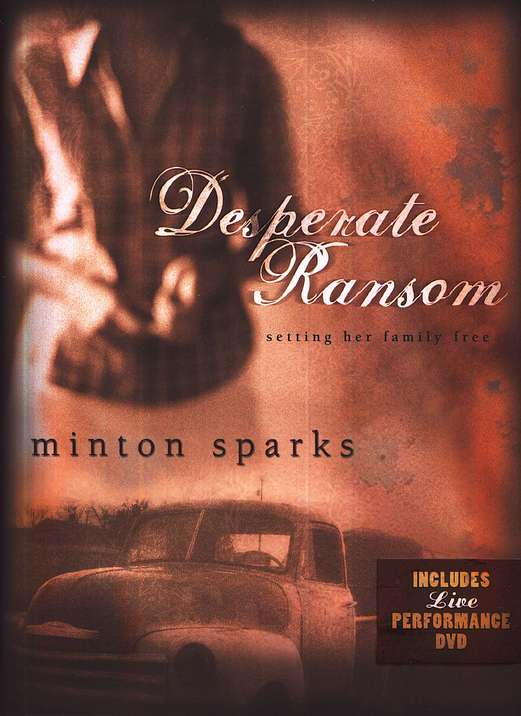 You have a book out – Desperate Ransom: Setting Her Family Free – that
some have described as demystifying your mythology of your own family’s life
experiences. (My paraphrase may be weak. Not sure one can actually demystify
mythology.) Some wish you hadn’t resolved some of your “stage” stories and
wished they’d been left hanging, like a 7th chord. What was your thinking in
conceiving the book approach? Jumping back for a moment, is it accurate to say
that you create mythologies around your personal experiences? This is an
approach common to writers, but is it accurately applied to you? Are your
memories filtered into a more theatrical fiction? You have a book out – Desperate Ransom: Setting Her Family Free – that
some have described as demystifying your mythology of your own family’s life
experiences. (My paraphrase may be weak. Not sure one can actually demystify
mythology.) Some wish you hadn’t resolved some of your “stage” stories and
wished they’d been left hanging, like a 7th chord. What was your thinking in
conceiving the book approach? Jumping back for a moment, is it accurate to say
that you create mythologies around your personal experiences? This is an
approach common to writers, but is it accurately applied to you? Are your
memories filtered into a more theatrical fiction?
It’s storytelling pure and simple. I think anytime you tell a story as a
writer you are mythologizing the fodder.
Your persona is defined around your ‘50s-era fashions and your decidedly
down-home presentation. To what extent is the Minton Sparks that most of us get
a chance to see a theatrical creation, and how much is just you as you? Are
there different versions of you for your different “audiences” – your
family, students, paid ticket holders?
My grandmother gave me a bunch of her old clothes and I had them altered. I
think I wear what I wear on stage in order to feel down deep into the
characters that I am talking about.
The title of your book suggests that this collection of stories is “setting
your family free?” What do you mean by that? What kind of a family did you
come from? Happy? Tragic?
My family is wonderful and colorful.
Do you feel limited in any way by your own self-definition, your “southernliness?”
Or are you “acting out” the essence of what is within?
Native soil is everything. Everybody speaks the language of place. Always
surprised by the response we get in places like Santa Barbara, CA and
Portland, Oregon. Audiences seem to resonate with the work on an emotional
level even if the southern thing is foreign..
I find your performance “courageous,” a kind of high-wire act depending
wholly upon your ability to spellbind an audience. It is an extraordinary gift.
Then again, you come across as a formidable person. How did you develop this
skill at hooking and holding the attention of a crowd? And what makes you so
tough?
I have no idea. I jump into performances with all four feet.
You don’t mind being the butt of your own joke, or making yourself the
object of your comedy. Your buck dance is quite amusing, in part because you
seem to enjoy looking funny doing it. It seems to have a cathartic effect,
particularly on the audience. Is that at all a part of why you do it? Does your
show require “decompression” from time to time?
I’ve taken the summer off to write and be with my two children. Yes, I
think the audience appreciates a breather. I have had people tell me that they
are "drained" emotionally after seeing my show.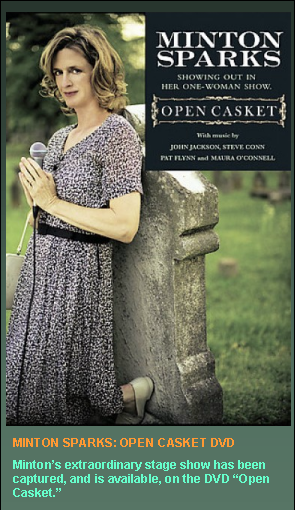
Part of the dynamic in a “one woman” show, it seems to me, is a tension
that exists between audience and performer. You take people on quite a roller
coaster ride of emotions, complete with perverse shifts from comedy to tragedy,
sometimes in the course of a single sentence. Do feel “perverse” in your
manipulation of your audience? Are you of a perverse nature?
When it’s good onstage, I’m heartbreakingly present. What I mean by
that is these characters/family members break my heart open. When this is
true, everything can happen.
How would you describe your audience? And, is it a different audience than
that you had envisioned when you created your show?
My audiences run the gamut. We play for University Audiences, festivals,
black box theaters. People who like literature, lyrically oriented music, and
theater love our shows. This past year, I opened some for John Prine and
Rodney Crowell. Their audiences were amazing. I was humbled by their
willingness to go into this genre with me.
If, generally speaking, you are doing a “concept piece,” what are the
walkaways? What does an audience come away with?
I’m not sure
I am always impressed by people whose talents include the wherewithal to
conceive of something grand and see it to fruition. First off, do you feel you
have achieved the vision you set out for your show? And if so, how do you
account for your own success? Or do you have a grander vision yet?
Such good questions…the idea for this show came to me while driving cross
country after my daughter was born. I wanted my children to have a bridge
leading back to the people and places they came from.
Beyond being a person with academic credentials, how did you get into
teaching? What classes are you teaching nowadays? Is it rewarding to you? Does
your stage persona play any role in the lecture hall?
I absolutely love teaching. I got a Masters in Psychology back in the 90’s
b/c I wanted to be a therapist. I worked as a therapist for a while and
quickly got burnout. I then taught Psychology at a TSU. For the past couple of
years I’ve taken off b/c of traveling to perform. I’ll go back to it here
soon.
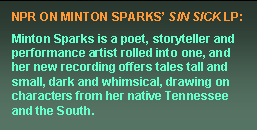 You are a mother, a performer, and a teacher. What aspects of your nature and
being do you enjoy most about yourself? And what aspects aren’t quite so hot,
in your eyes? You are a mother, a performer, and a teacher. What aspects of your nature and
being do you enjoy most about yourself? And what aspects aren’t quite so hot,
in your eyes?
In third grade I wrote down that the thing I liked best about myself was
"my muscles". Sadly, that would be a fruitless thing to enjoy at
this point. Hmmm. I enjoy laughing probably more than anything else.
Not to sound like a cad, but you are joltingly beautiful at times, though you
have a chameleon-like ability to don visages. You can look quite severe, even
menacing. You can appear homey and sweet, and also a little crazy. One of these
faces must be most naturally you? Which one?
Well thank you. I think that I shape-shift into my characters. If the char.
is severe then so am I. Most like me: Vickie Pickles Momma
What kind of a girl were you? Were you popular, sought after? What kind of
classmates were you attracted to?
I played basketball through college. So I was the girl in sweats riding my
bike and shooting hoops. Best friends were genuine people who made me laugh.—still
are.
What are your priorities now? Where do you want life to go?
Priorities: macro: See the War End, National Health Care coverage . Micro:
my family, finish this novel I'm working on, learn Spanish, get more
organized.
Are you, generally speaking, a music fan? Do you listen to music? If so, who
and what?
I am a huge music fan. Right now I love Mavis Staples, Rufus Wainwright,
Ben Harper, Delbert McClinton--lots of singer/songwriters.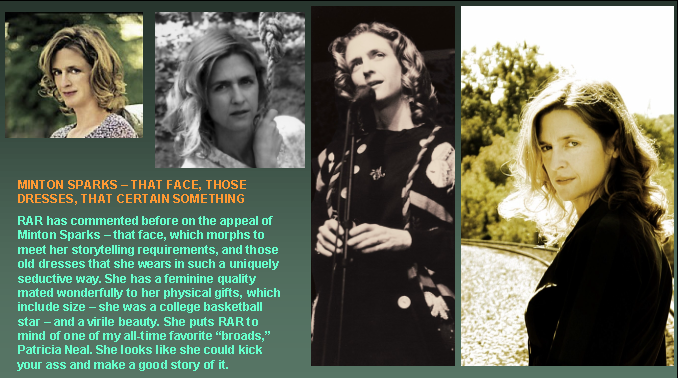
What is the best thing happening with Minton Sparks right now?
Let’s see…I’m going to be at the International Storytelling Festival
for the first time in October. I’ll be at the Southern Women’s Writer’s
conference in September. Going on tour with Rodney Crowell, Elizabeth Cook,
and Will Kimbrough this Fall.
What is the one thing that concerns you most right now?
I stay so concerned over so many issues that I don't sleep much.
I saw the movie, "Sicko" last night---I’m sick over all the
people who don’t have Health Care or who have insurance and they get denied.
Learn
more about Minton Sparks by visiting her
website at www.www.mintonsparks.com.
GO TO:
ARTIST NEWS
•
YOU
ARE ON A SPECIAL FEATURES PAGE
|
 |
|
©Rick
Alan Rice (RAR),
May, 2012
|
| 
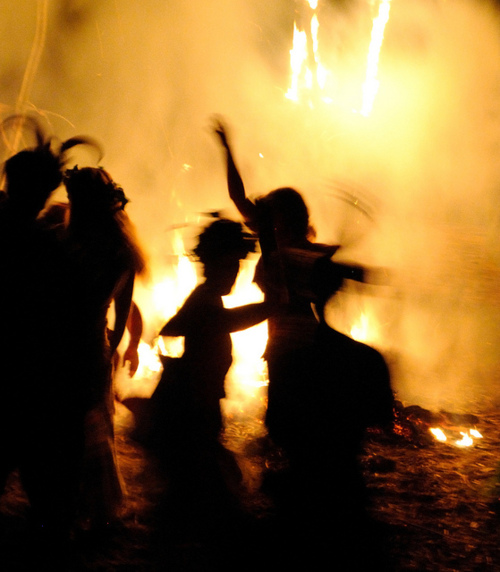
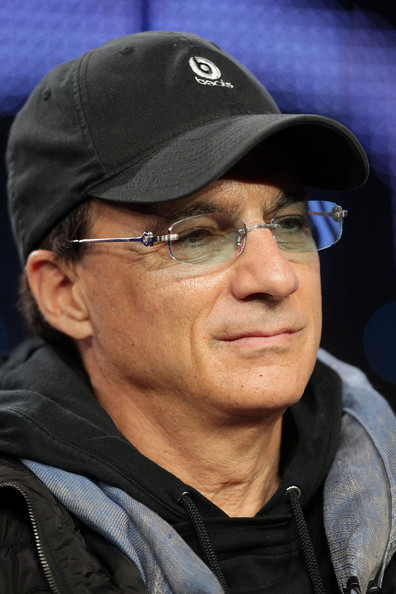 Learning
from Jimmy Iovine
Learning
from Jimmy Iovine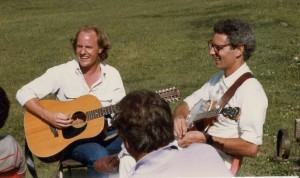
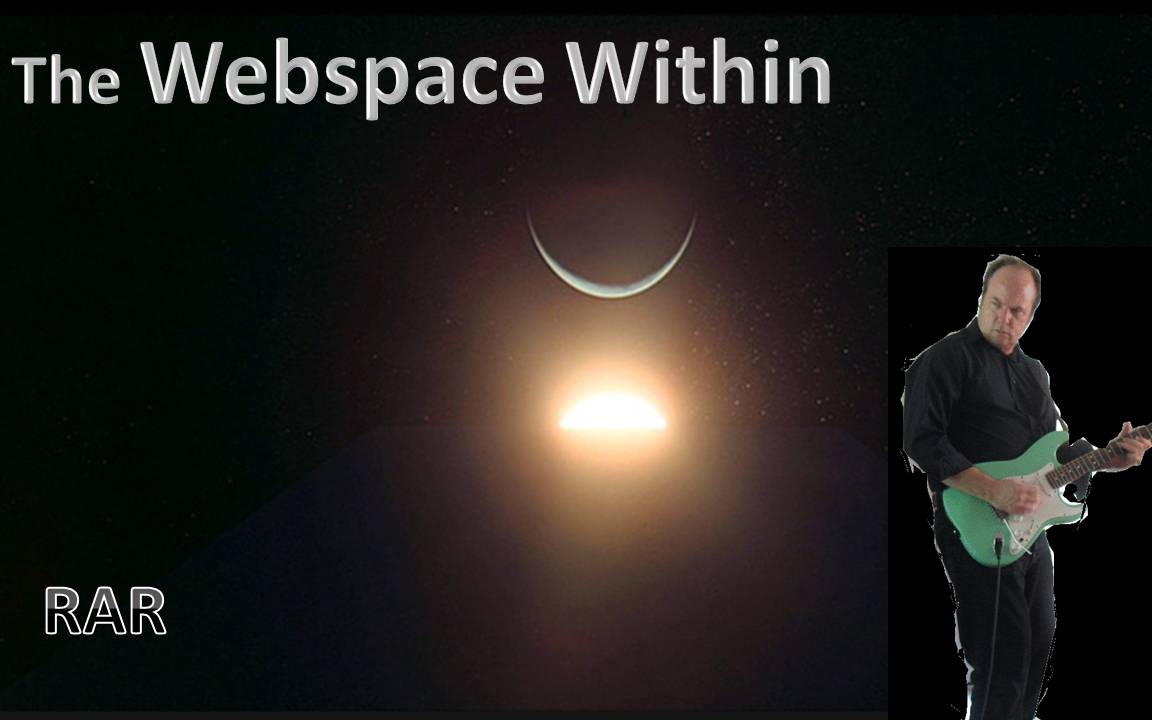


 My name comes from my maternal grandmother. She was a Minton and married a
Sparks. I often run into folks who know we must be related b/c if you’re
from Arkansas and associated with both of those names, you are related to me.
In my heart I was born to play professional basketball but the WNBA went on
hiatus the year I wanted to try out.
My name comes from my maternal grandmother. She was a Minton and married a
Sparks. I often run into folks who know we must be related b/c if you’re
from Arkansas and associated with both of those names, you are related to me.
In my heart I was born to play professional basketball but the WNBA went on
hiatus the year I wanted to try out.
 You have a book out – Desperate Ransom: Setting Her Family Free – that
some have described as demystifying your mythology of your own family’s life
experiences. (My paraphrase may be weak. Not sure one can actually demystify
mythology.) Some wish you hadn’t resolved some of your “stage” stories and
wished they’d been left hanging, like a 7th chord. What was your thinking in
conceiving the book approach? Jumping back for a moment, is it accurate to say
that you create mythologies around your personal experiences? This is an
approach common to writers, but is it accurately applied to you? Are your
memories filtered into a more theatrical fiction?
You have a book out – Desperate Ransom: Setting Her Family Free – that
some have described as demystifying your mythology of your own family’s life
experiences. (My paraphrase may be weak. Not sure one can actually demystify
mythology.) Some wish you hadn’t resolved some of your “stage” stories and
wished they’d been left hanging, like a 7th chord. What was your thinking in
conceiving the book approach? Jumping back for a moment, is it accurate to say
that you create mythologies around your personal experiences? This is an
approach common to writers, but is it accurately applied to you? Are your
memories filtered into a more theatrical fiction?
 You are a mother, a performer, and a teacher. What aspects of your nature and
being do you enjoy most about yourself? And what aspects aren’t quite so hot,
in your eyes?
You are a mother, a performer, and a teacher. What aspects of your nature and
being do you enjoy most about yourself? And what aspects aren’t quite so hot,
in your eyes?
